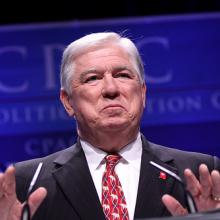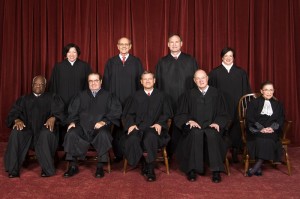separation of church and state

Seal of the U.S. Dept of the Air Force. Image via Wiki Commons, http://bit.ly/xAxyYH.
Dozens of members of Congress are upset that the Air Force has removed the Latin word for "God" from the logo of an Air Force acquisitions office.
Led by Rep. J. Randy Forbes, co-chairman of the Congressional Prayer Caucus, 36 lawmakers Monday (Feb. 6) sent a letter to Air Force Secretary Michael Donley and Air Force Chief of Staff General Norton Schwartz objecting to the removal of "God" from the logo of the Air Force Rapid Capabilities Office (RCO).
The logo was recently removed, according to Forbes, after objections by the Military Association of Atheists and Freethinkers.

Gov. Haley Barbour. Image via Wylio http://bit.ly/zzEQH5.
Suppose there are two inmates convicted of similar crimes. Both appear to be equally contrite and rehabilitated. One is black, the other white. The white one gets pardoned by the governor, the black one does not. Is this fair?
What if one was rich, the other poor? If one had political donors for friends, but not the other? And what if most of those pardoned by this same governor were white, rich, politically connected, or they were convicted of quite violent crimes?
Judging by the reactions to former Governor Haley Barbour's granting pardons or clemency to 200 or so felons on his last day as governor of Mississippi in January 2012, this seem to be the point at which many raise their hands, asking, "what is going on here?"
To my eyes, Gov. Barbour unfairly (and illegally?) predetermined who was eligible to be pardoned based upon their professing the adoption of his religion.

Pointsettia. Image via http://www.wylio.com/credits/Flickr/4170977646
Forget about that creche on the town green or the menorah outside the public library that the nice folks from Lubavitch Chabad will light for the first time tonight.
Now the Special Ops Humbug Unit of the War on Christmas has come for ... our flowers. Well, our shrubbery, technically.
The U.S. Supreme Court is set to begin hearing oral arguments this week in one of the most important church-state cases in decades. In Hosanna-Tabor Church v. Equal Employment Opportunity Commission, the court will consider whether a Lutheran school in Michigan is subject to a federal law banning discrimination based on a disability.
Deep down I don't believe in the separation of church and state. Oh, I am against the idea of a state church or giving political preference to one religious sect or another, but it's the idea that somehow people can divorce their religious identity from their political identity that I just can't accept. That either our religion or our politics mean so little to us that we could restrict them to compartmentalized spheres in our lives seems absurd to me. I know people attempt to do it all the time, believing in the modern myth that an individual can assume an objective stance in this world, but reality is a lot more complex than that.
Desmond Tutu, the Anglican archbishop of Cape Town and winner of the 1984 Nobel Peace Prize when this article appeared, was interviewed at his home in Bishopscourt outside Cape Town.
Jim Wallis: We would very much like to hear your perspective on what people speak of as the new era for the church in South Africa, the new level in the struggle against apartheid as the church moves to the front lines.
Desmond Tutu: In many ways the church—perhaps less spectacularly in the past—has been involved in this struggle for some time. Church people have been responsible for bringing the Namibian issue [South Africa's illegal occupation of neighboring Namibia] before the United Nations. And they have brought the plight of squatters very much to the fore.
For instance, the church was involved over the issue of forced population removals, particularly in Mogopa, one of the villages that the government "moved." The South African Council of Churches, with a number of church leaders, was there. We went and stood with the people to try to support them at a time when they were under threat.
Perhaps the government had not yet learned how to be thoroughly repressive so that the church did not need, in many ways, to be quite so spectacular. There were other avenues available for people, avenues that were more explicitly political.
What is different, perhaps, now is that the government has progressively eliminated most of the other organizations which legitimately could have been around to articulate the people's concern. And their repression has intensified. They have chosen the military option.
